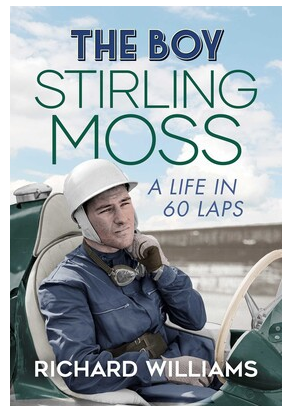Reviewed by Kieron Fennelly
Author: Richard Williams
Published by: Simon and Schuster: https://www.simonandschuster.co.uk/
306 pages (hardback)
UK List Price: £20.00 (but may vary with retailer)
ISBN: 978-1-4711-9845-8
Moss died in 2020 and this book is the first able to look back on his whole life. More has been written about Stirling Moss than any other British racing driver, indeed probably any other sportsman, and author Richard Williams acknowledges his debt to previous biographers. Rather than reproduce then a blow-blow account of Moss’s life, Williams has written an appreciation in sixty compact chapters, the sixty laps.
While the major events of Moss’s fifteen-year career from Prescott hill climbs to Goodwood on that fateful Easter Monday are well known, many of the author’s reflections, often on lesser-known periods, are compellingly different. The opening chapter for example has Williams invited in 2017 to Pescara, the scene of his 2004 work, ‘the Last Road Race,’ to receive a trophy on behalf of an already bedridden Moss to commemorate the sixtieth anniversary of his victory there. The author duly took the trophy to the famous mews house in Mayfair where Moss had lived since 1961. Moss was too ill to receive him so he handed the trophy to a nurse and “I walked away as the door closed on a house full of the memories of his 212 victories from 529 races…….now one more object had been added to the gallery: I had taken the Boy his last trophy.”
In the quarter century since his “The Death of Ayrton Senna,” Williams has honed his engagingly personal style and here on familiar territory it works almost to perfection. The opening chapter sets the tone as the author selects moments from Moss’s career, and not always the obvious examples, such as the 1955 Mille Miglia, to develop his subject’s character. In chapter 25, titled ‘Versatile’ he recalls Moss’s early rally career, later subsumed by his racing commitments which neatly confirms the adage that Moss could get into a given car and drive it faster than anyone else had. Readers of a certain generation will appreciate the account of Moss’s appearance in 1959 on ‘This is Your Life,’ but even more revealing because it was rather more challenging is his interview with John Freeman on the pioneering ‘Face to Face.’ Williams who has diligently read the transcript shows how Moss, “The seventeenth of 35 subjects during (the programme’s) three years,” responded to Freeman’s questions unflinchingly, even when the interviewer asked whether he was fit to be a married while still active in motor racing (and his own marriage to Katie was disintegrating.)
But a hagiography this book is not: moving to more recent events, the author raises aspects of Moss’s views, in particular his attitude to ‘crumpet,’ and patriotism which to some seemed at very least anachronistic. On the former, a man of his time and background, Moss appears unapologetic, but, explains Williams when patriotism seemed to be merging with an increasingly ugly Brexit nationalism, he was quickly persuaded to dissociate himself from it. At several points the author refers to Moss’s penny-pinching attitudes (a thorn in his first marriage) but remains elegantly unjudgemental.
VERDICT
An exceptional individual, Stirling Moss has inspired many books, some of which are themselves exceptional. Informed and immensely absorbing, “Stirling Moss, a Life in 60 Laps,” is an apt and perhaps final addition to this library.
